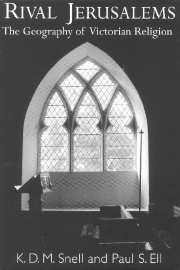Book contents
- Frontmatter
- Contents
- List of figures
- List of tables
- Preface and acknowledgements
- Introduction
- Part 1 Religious geographies: the districts of England and Wales
- Part 2 Religion and locality: parish-level explorations
- 7 A prospect of fifteen counties
- 8 From Henry Compton to Horace Mann: stability or relocation in Catholicism and Nonconformity, and the growth of religious pluralism
- 9 The Sunday school movement: child labour, denominational control and working-class culture
- 10 Free or appropriated sittings: the Anglican Church in perspective
- 11 Conformity, dissent and the influence of landownership
- 12 Urbanisation and regional secularisation
- Technical appendices
- Bibliography
- Index
11 - Conformity, dissent and the influence of landownership
Published online by Cambridge University Press: 08 August 2009
- Frontmatter
- Contents
- List of figures
- List of tables
- Preface and acknowledgements
- Introduction
- Part 1 Religious geographies: the districts of England and Wales
- Part 2 Religion and locality: parish-level explorations
- 7 A prospect of fifteen counties
- 8 From Henry Compton to Horace Mann: stability or relocation in Catholicism and Nonconformity, and the growth of religious pluralism
- 9 The Sunday school movement: child labour, denominational control and working-class culture
- 10 Free or appropriated sittings: the Anglican Church in perspective
- 11 Conformity, dissent and the influence of landownership
- 12 Urbanisation and regional secularisation
- Technical appendices
- Bibliography
- Index
Summary
Introduction
Historians have had a long-standing interest in the consequences of landownership for local religious geography. The discussion has involved pioneering scholars like Alan Everitt, in his The Pattern of Rural Dissent, Dennis Mills in his Lord and Peasant in Nineteenth-century Britain, Margaret Spufford, James Obelkevich, Brian Short and many others. Most have discussed the issues with reference to smaller areas or groups of parishes than are covered in this book, and it is now worth developing the analysis further with larger-scale data which might further resolve some of the questions.
There are many important historical issues that need to be addressed. It is often said that ‘open’ parishes, of varied and wide landownership, were most prone to accommodate dissent, while ‘close’ parishes were much more conformist. Some historians even suggest that religion is a defining element in the historical considerations that set the more extreme so-called ‘open’ and ‘close’ villages apart from each other: that religion expressed the different ways in which landed power was exercised, and the parochially varied leeway for independence of mind. In the ‘close’ settlements, it has been argued, land could be made inaccessible for chapel building, much as there was often control over housing in the interests of keeping the population low and manageable.
- Type
- Chapter
- Information
- Rival JerusalemsThe Geography of Victorian Religion, pp. 364 - 394Publisher: Cambridge University PressPrint publication year: 2000



